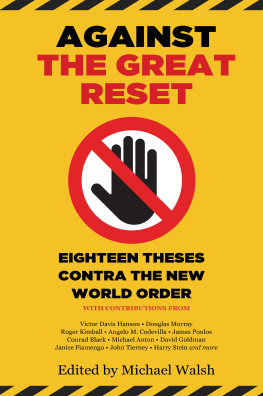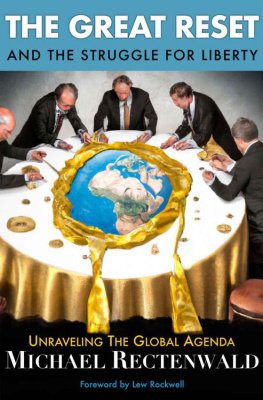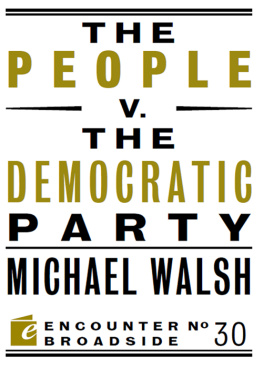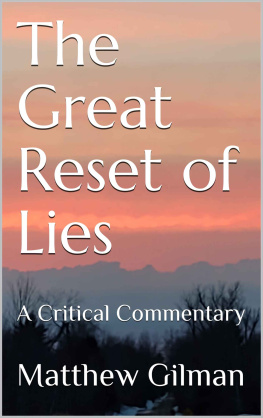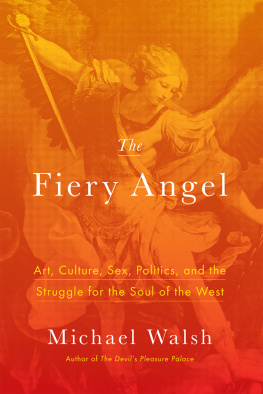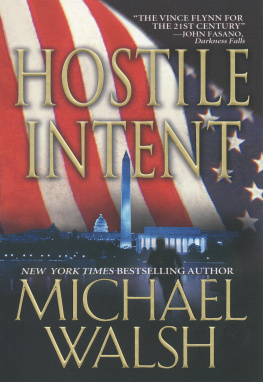Walsh Michael - Against the Great Reset
Here you can read online Walsh Michael - Against the Great Reset full text of the book (entire story) in english for free. Download pdf and epub, get meaning, cover and reviews about this ebook. year: 2022, publisher: Post Hill Press, genre: Politics. Description of the work, (preface) as well as reviews are available. Best literature library LitArk.com created for fans of good reading and offers a wide selection of genres:
Romance novel
Science fiction
Adventure
Detective
Science
History
Home and family
Prose
Art
Politics
Computer
Non-fiction
Religion
Business
Children
Humor
Choose a favorite category and find really read worthwhile books. Enjoy immersion in the world of imagination, feel the emotions of the characters or learn something new for yourself, make an fascinating discovery.
- Book:Against the Great Reset
- Author:
- Publisher:Post Hill Press
- Genre:
- Year:2022
- Rating:3 / 5
- Favourites:Add to favourites
- Your mark:
- 60
- 1
- 2
- 3
- 4
- 5
Against the Great Reset: summary, description and annotation
We offer to read an annotation, description, summary or preface (depends on what the author of the book "Against the Great Reset" wrote himself). If you haven't found the necessary information about the book — write in the comments, we will try to find it.
Against the Great Reset — read online for free the complete book (whole text) full work
Below is the text of the book, divided by pages. System saving the place of the last page read, allows you to conveniently read the book "Against the Great Reset" online for free, without having to search again every time where you left off. Put a bookmark, and you can go to the page where you finished reading at any time.
Font size:
Interval:
Bookmark:

Published by Bombardier Books
An Imprint of Post Hill Press
ISBN: 978-1-63758-630-3
ISBN (eBook): 978-1-63758-631-0
Against the Great Reset:
Eighteen Theses Contra the New World Order
2022 by the-Pipeline.org
All Rights Reserved
Cover Design by Matt Margolis
No part of this book may be reproduced, stored in a retrieval system, or transmitted by any means without the written permission of the author and publisher.


Post Hill Press
New York Nashville
posthillpress.com
Published in the United States of America
To the memory of Angelo Codevilla ( 19432021)
Author, comrade, teach er, friend
Contents
China, COVID-19, Realpolitik , and the Great Reset
By Douglas Murray
The Economic Consequences of the Great Reset
By David P. Goldman
The Shape of Things to Come: The Tyranny of Covid-19
By John Tierney
You Will Be Made to Laugh: Humor Under the Great Reset
By Harry Stein
Green Energy and the Future of Transportation
By Salvatore Babones
The Anti-Industrial Revolution
By Martin Hutchinson
The Great Reset and Stakeholderism
By Alberto Mingardi
History under the Great Reset
By Jeremy Black
Dueling Faiths: Science and Religion under the Great Reset
By Richard Fernandez
What an Artist Dies in Me!
By Michael Walsh


By Mic hael Walsh
What is the Great Reset and why should we care? In the midst of a tumultuous medical-societal breakdown, likely engineered by the Chinese Communist Party and abetted by Americas National Institutes of Health gain of function financial assistance to the Wuhan Institute of Virology, why is the Swiss-based World Economic Forum (WEF) advocating a complete re-imagining of the Western worlds social, economic, and moral structures? And why now? What are its aspirations, prescriptions, and proscriptions, and how will it prospectively affect us? Its a question that the men and women of the WEF are hoping you wont ask.
This book seeks to supply the answers. It has ample historical precedents, from Demostheness fulminations against Philip II of Macedon (Alexanders father), Ciceros Philippics denouncing Mark Antony, the heretic-hunting Tertullians Adversus Marcionem and the philosopher Friedrich Nietzsches Nietzsche contra Wagner . Weighty historical issues are often best debated promptly, when something can yet be done about them; in the meantime, historians of the future can at least understand the issues as the participants themselves saw and experienced them. Whether the formerly free world of the Western democracies will succumb to the paternalistic totalitarianism of the oligarchical Resetters remains to be seen. But this is our attempt to stop it.
So great is mankinds perpetual dissatisfaction with its present circumstances, whatever they may be, that the urge to make the world anew is as old as recorded history. Eve fell under the Serpents spell, and with the plucking of an apple, sought to improve her life in the Garden of Eden by becoming, in Miltons words, as Gods, Knowing both Good and Evil, as they know. The forbidden fruit was a gift she shared with Adam; how well that turned out has been the history of the human race ever since. High aspirations, disastrous results.
The expulsion from the Garden, however, has not discouraged others from trying. Indeed, the entire chronicle of Western civilization is best regarded as a never-ending and ineluctable struggle for cultural and political superiority, most often expressed militarily (since that is how humans generally decide matters) but extending to all things both spiritual and physical. Dissatisfaction with the status quo may not be universaltimeless and static Asian cultures, such as Chinas, have had it imposed upon them by external Western forces, including the British and the Marxist-Leninistsbut it has been a hallmark of the occident and its steady civilizational churn that dates back at least to Homer, Plato, Aeschylus, Herodotus, Pericles, and Alexander the Great, with whom Western history properly begins.
The philosopher Friedrich Nietzsche, assaying the inelegant Koine, or demotic, Greek of the New Testament in Beyond Good and Evil , observed: Es ist eine Feinheit, da Gott griechisch lernte, als er Schriftsteller werden wollteund da er es nicht besser lernte : Its a particular refinement that God learned Greek when he wanted to become a writerand that he didnt learn it better. Nietzsche, the preachers son who became through sheer willpower a dedicated atheist, was poking fun at the fundamentalist belief that the Christian scriptures were the literal words of God himself (Muslims, of course, believe the same thing about the Koran, except more so). If something as elemental, as essential to Western thought as the authenticity of the Bible, not to mention Gods linguistic ability, could be questioned and even mocked, then everything was on the tableincluding, in Nietzsches case, God Himself.
With the death of Godor of a godNietzsche sought liberation from the moral jiu-jitsu of Jesus: that weakness was strength; that victimhood was noble; that renunciationof love, sex, power, ambitionwas the highest form of attainment. That Nietzsches rejection of God was accompanied by his rejection of Richard Wagner, whose music dramas are based on the moral elevation of rejection, is not coincidental; the great figures of the nineteenth century, including Darwin and Marx, all born within a few years of each other, were not only revolutionaries, but embodied within themselves antithetical forces that somehow evolved into great Hegelian syntheses of human striving with which we still grapple today.
Wagner, the Schopenhauerian atheist who staggered back to Christianity and the anti-Semite who engaged the Jew Hermann Levi as the only man who could conduct his final ode to Christian transfiguration, Parsifal . Charles Darwin, ticketed for an Anglican parsonage but mutating into the author of On the Origin of Species, The Descent of Man , and all the way to The Formation of Vegetable Mould through the Action of Worms . Karl Marx, the scion of rabbis whose father converted to Lutheranism and, like Wagner for a time, a stateless rebel who preached that the withering away of the state itself was inevitableand yet the state endures, however battered it may be at the moment.
Its fitting that the Great Reset of capitalism is the brainchild of the WEF, which hosts an annual conference in the Alpine village of Davosthe site of the tuberculosis sanatorium to which the naf Hans Castorp reports at the beginning of Thomas Manns masterpiece, The Magic Mountain . completeupon the outbreak of World War I, in which we assume he will meet the death, random and senseless, that he has been so studiously avoiding yet simultaneously courting at the Berghof.
Central Europe, it seems, is where the internal contradictions of Western civilization are both born and, like Martin Luther at Eisleben, go home to die. And this is where the latest synthetic attempt to replace God with his conqueror, Man, has emerged: in the village of Davos, in the canton of Graubnden, Switzerland: the site of the annual meeting of the WEF led by the German-born engineer and economist Klaus Schwab, born in Ravensburg in 1938, the year before Hitler and Stalin began carving up Poland and the Baltics.
Next pageFont size:
Interval:
Bookmark:
Similar books «Against the Great Reset»
Look at similar books to Against the Great Reset. We have selected literature similar in name and meaning in the hope of providing readers with more options to find new, interesting, not yet read works.
Discussion, reviews of the book Against the Great Reset and just readers' own opinions. Leave your comments, write what you think about the work, its meaning or the main characters. Specify what exactly you liked and what you didn't like, and why you think so.

